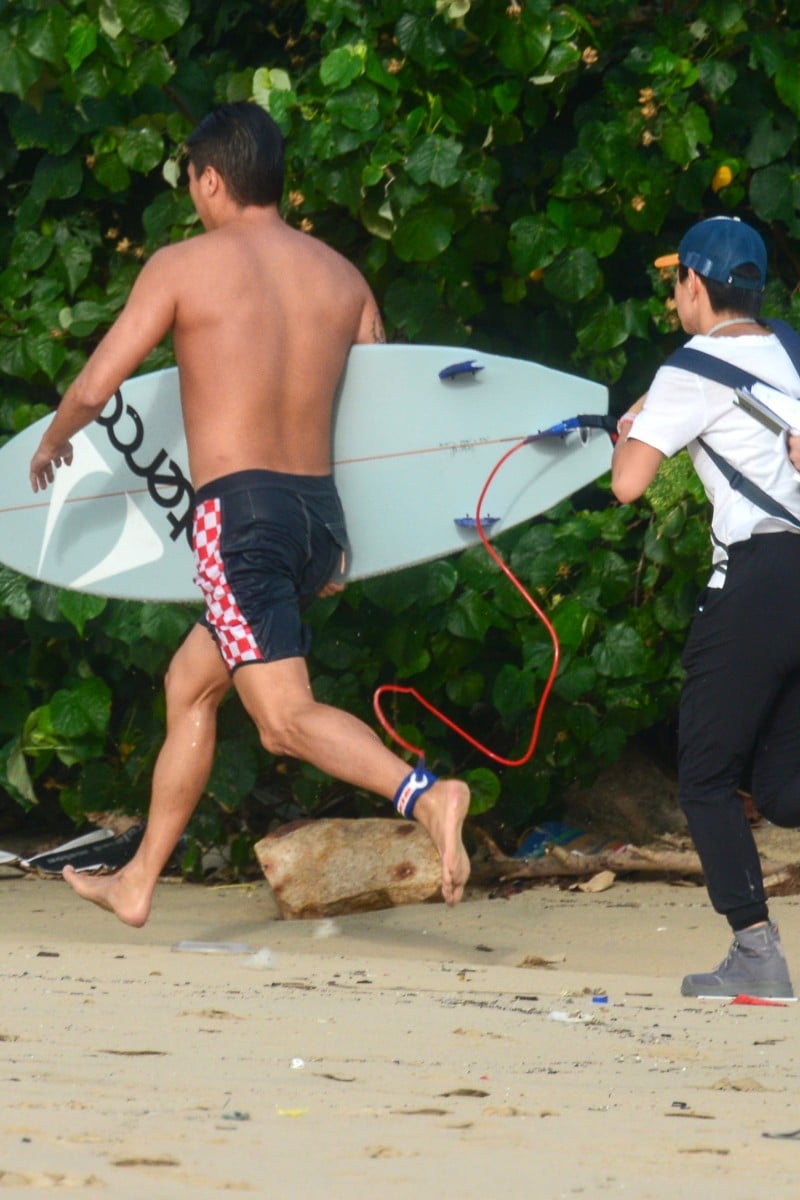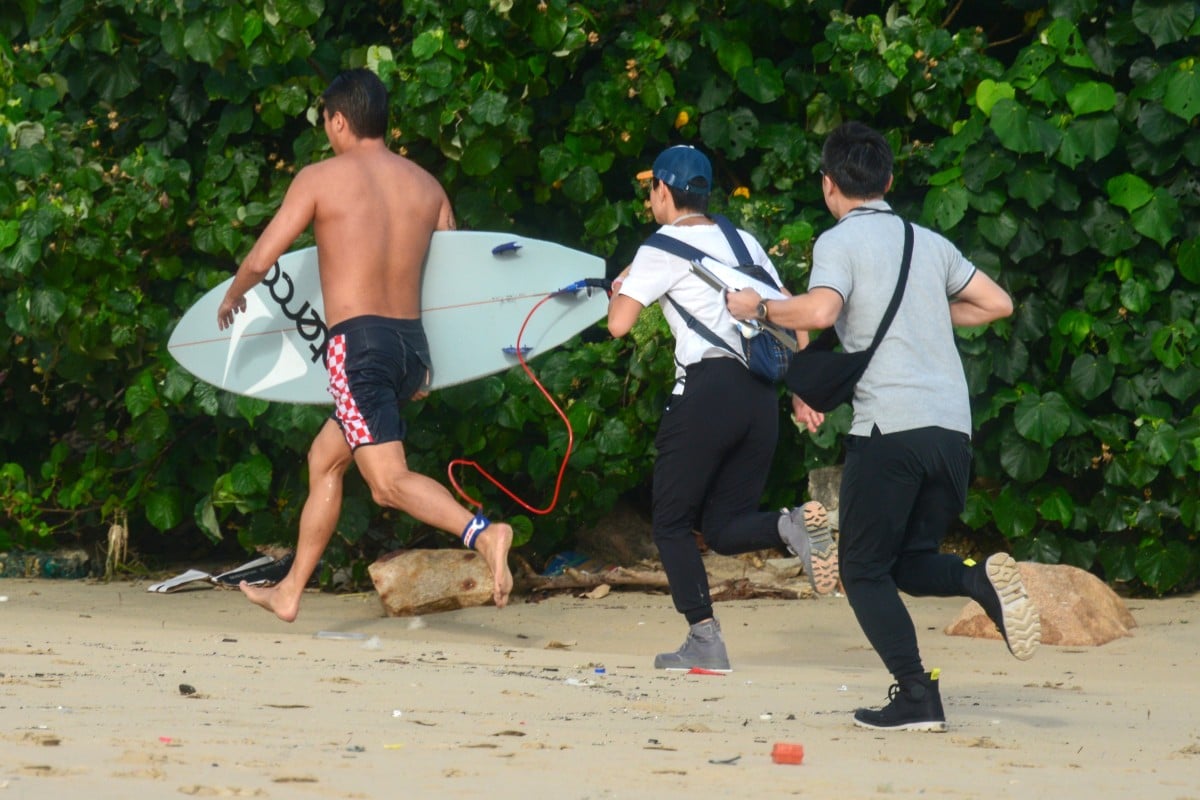
Face Off: Should Hong Kong loosen the ban on surfing?
Each week, two readers discuss a hot topic in a parliamentary-style debate that doesn’t necessarily reflect their personal viewpoints.
 A surfer runs away from Leisure and Cultural Services Department staff trying to get his details. Photo: Antony Dickson
A surfer runs away from Leisure and Cultural Services Department staff trying to get his details. Photo: Antony DicksonIf you are interested in joining future Face Off debates, fill out this form to submit your application.
For: Claudia Loh, 15, Po Leung Kuk Choi Kai Yau School
Hong Kong has cracked down on surfing, reinforcing its harsh ban across 42 public beaches. They reason that surfboards in the sea may be a safety risk to swimmers and first aid responders.
The city should loosen its ban. Surfers in Hong Kong deserve the opportunity to develop their skills freely, within reason.
A 10-year-old surfing star in Hong Kong cannot represent the city in the Olympics or other sports competitions despite his desire to.
There is no way to train in Hong Kong due to the enforcement of the surfing ban. With no Hong Kong national surfing team, the boy – who has Swiss parents – is training in Switzerland and has made its Junior National Surf team.
Hong Kong’s crackdown on surfing ban leads to confusion
Surfing is an Olympic sport which debuted in 2021 at the Tokyo Games. It has already been approved for the 2028 Summer Olympics in Los Angeles.
Hong Kong ranked 37th in the 2024 Paris Olympics. The government should seize the opportunity to develop its young generation of surfers, who would bring the city further pride and glory.
If the surfing ban were loosened, we could ride the waves and train athletes openly who would represent us on the global stage.
Although dangerous weather is a worthwhile safety concern, it should not mean an absolute ban on surfing. The government should consider introducing limitations and regulations.
Beaches in Hong Kong use a water safety flag system to warn visitors and swimmers of any dangers. For example, the public cannot visit the shoreline during rough weather. Similar flags can be implemented to show when the beach is safe to visit and to surf.
The more crowded a beach is, the higher the chance of accidents. Hong Kong can introduce a regulation that includes a maximum number of people who can surf during specific periods instead of enforcing a blanket ban.
Surfing isn’t always dangerous. We can compare it to another sport, such as rock climbing.
Despite the clear dangers and hazards of rock climbing, including being perilous during bad weather, there is no blanket ban on the activity. For rock climbing – and surfing – it seems more logical to introduce reasonable limitations and conditions on a case-by-case basis.
Surfing is a unique sport that should be encouraged, not banned, in Hong Kong. The government should introduce regulations that keep safety in mind and reverse its blanket ban.
Should foreign domestic helpers be given the same wages and rights as other workers?
Against: Nicholas Tanner, 16, Chinese International School
The government’s ban on surfing should not be loosened. The primary concern is the safety of both surfers and other beachgoers.
Surfing is a dangerous sport, especially in areas with large waves. The presence of surfers in swimming zones increases the risk of collisions and accidents, potentially endangering swimmers who may be unaware.
The Leisure and Cultural Services Department (LCSD) has stated that surfing has always been prohibited at LCSD-managed beaches due to these safety risks.
When beach conditions are hazardous, such as during typhoons or black rain, the risk of accidents is significantly higher. Allowing surfing during these periods could lead to serious injuries or even fatalities, as surfers may underestimate the dangers of rough seas and strong currents. Enforcing the ban will address public complaints and maintain order at the beaches.
Officials have expressed that allowing surfing could lead to an influx of surfers. Overcrowding could negatively affect other visitors’ overall beach experience, leading to dissatisfaction and complaints.
It could also compromise the environment, as increased foot traffic and activity could damage sensitive marine coastal ecosystems.
Equal facilities for low-income elderly, embracing body positivity (short letters)
The ban ensures that lifeguards can focus on their primary duty of keeping swimmers safe. With surfing prohibited, lifeguards can concentrate on monitoring swimming areas without the added responsibility of managing surfers.
This focus is crucial. Lifeguards are trained to handle emergencies, but their efficiency can be compromised if they are spread too thin. By limiting the activities they need to oversee, the ban helps ensure that lifeguards can respond quickly and effectively to any incident.
Surfboards and other equipment can inadvertently harm marine animals or disturb their habitats. The ban can help minimise these potential effects, promote the marine environment’s long-term health, and allow the government to better control and protect coastal areas’ ecological balance.
In conclusion, the surfing ban in Hong Kong prioritises the safety of all beach visitors, addresses public overcrowding concerns, supports lifeguards’ work, and helps preserve the natural environment.
Loosening the ban on surfing could compromise these critical objectives. While it may be unpopular among enthusiasts, the ban is necessary for all beachgoers’ well-being and enjoyment.
